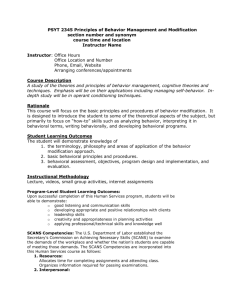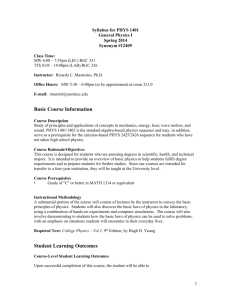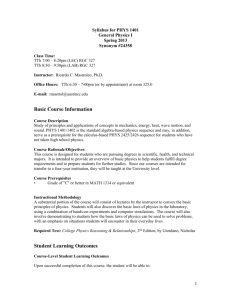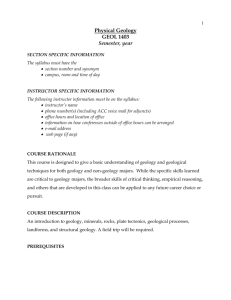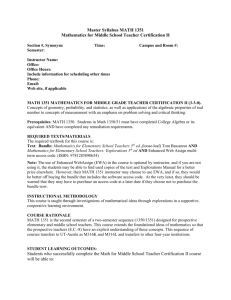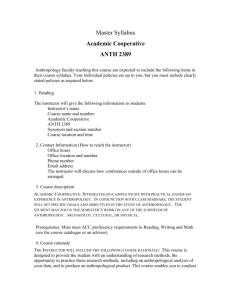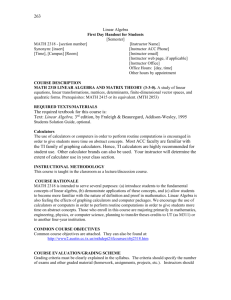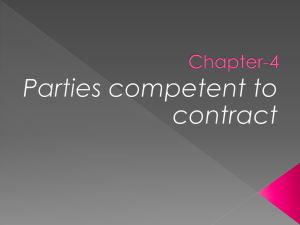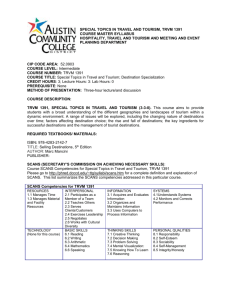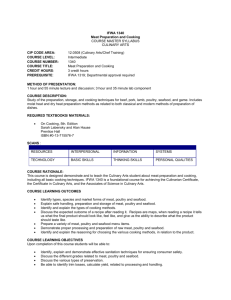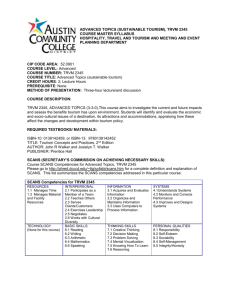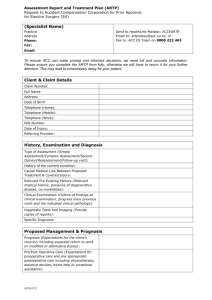weeks #/ dates - Austin Community College
advertisement
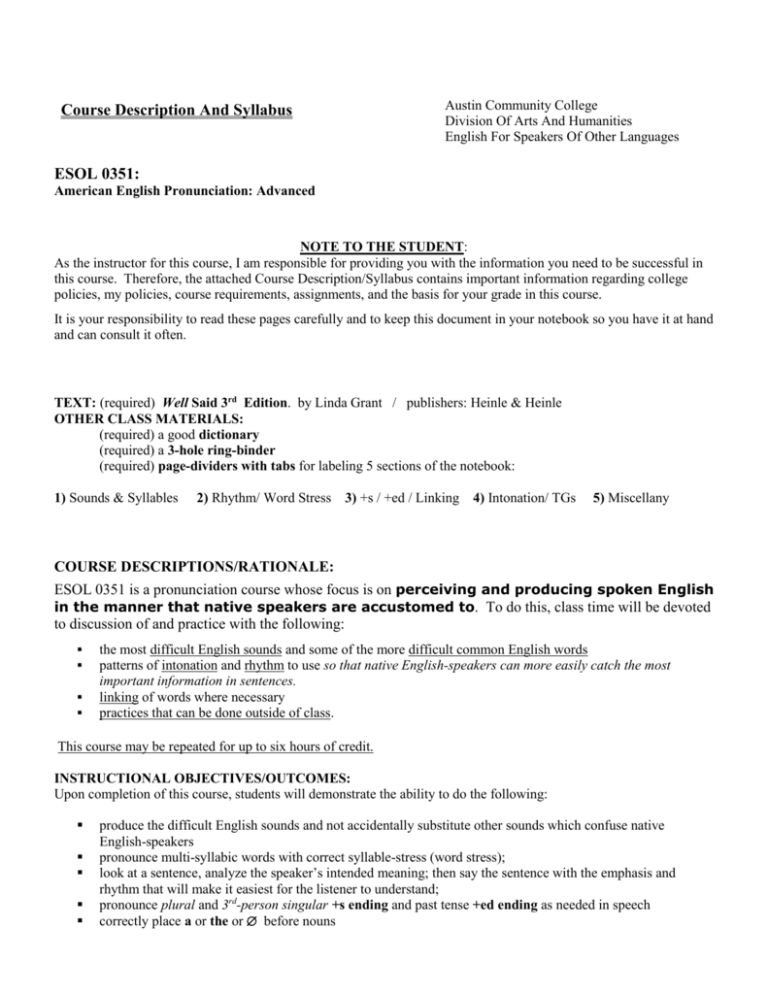
Course Description And Syllabus Austin Community College Division Of Arts And Humanities English For Speakers Of Other Languages ESOL 0351: American English Pronunciation: Advanced NOTE TO THE STUDENT: As the instructor for this course, I am responsible for providing you with the information you need to be successful in this course. Therefore, the attached Course Description/Syllabus contains important information regarding college policies, my policies, course requirements, assignments, and the basis for your grade in this course. It is your responsibility to read these pages carefully and to keep this document in your notebook so you have it at hand and can consult it often. TEXT: (required) Well Said 3rd Edition. by Linda Grant / publishers: Heinle & Heinle OTHER CLASS MATERIALS: (required) a good dictionary (required) a 3-hole ring-binder (required) page-dividers with tabs for labeling 5 sections of the notebook: 1) Sounds & Syllables 2) Rhythm/ Word Stress 3) +s / +ed / Linking 4) Intonation/ TGs 5) Miscellany COURSE DESCRIPTIONS/RATIONALE: ESOL 0351 is a pronunciation course whose focus is on perceiving and producing spoken English in the manner that native speakers are accustomed to. To do this, class time will be devoted to discussion of and practice with the following: the most difficult English sounds and some of the more difficult common English words patterns of intonation and rhythm to use so that native English-speakers can more easily catch the most important information in sentences. linking of words where necessary practices that can be done outside of class. This course may be repeated for up to six hours of credit. INSTRUCTIONAL OBJECTIVES/OUTCOMES: Upon completion of this course, students will demonstrate the ability to do the following: produce the difficult English sounds and not accidentally substitute other sounds which confuse native English-speakers pronounce multi-syllabic words with correct syllable-stress (word stress); look at a sentence, analyze the speaker’s intended meaning; then say the sentence with the emphasis and rhythm that will make it easiest for the listener to understand; pronounce plural and 3rd-person singular +s ending and past tense +ed ending as needed in speech correctly place a or the or before nouns MINIMUM ENTRANCE REQUIREMENTS/PREREQUISITES: Grade of “C” or better in ESOL 0383 or placement in the course by the ESOL assessment test. EVALUATION: You will be expected to learn and be able to talk about and use the features of the English sound system so that you can put the information into practice in your real life. There will be tests over materials covered; however, course grade will largely be based on effort and improvement in actual intelligibility. Difficulties with pronunciation are different for all language learners, so there is no “standard” by which you will be judged. Rather, a baseline will be established to identify what areas of pronunciation you need to focus on, and evaluations by the instructor (both oral and written) will determine how much you have progressed. The following categories and percentages represent how your final grade will be determined. Preparation (knowing previous class’s material) / Homework…..…..…..…..20% Participation (includes always having binder correctly ordered)..….…….… 20% Quizzes...…………..………………………………………..….……...……..20% Exams...............................................................................................................20% Final presentation…………………………………..……….………..…..…..20% Grading Scale: A = 100 - 90% B = 80 - 89% C = 70 - 79% D = 65 - 69% F = Below 65 Tutors are available to you in the tutoring labs, and the assistance is free! Also, there are computer programs available if you want more grammar practice. Please see me if you are interested in these supplementary activities. Preparation/Homework/Recordings and Participation: These account for 40% of your final grade. Your preparation and participation in class are essential. And because submitting homework on time shows me that you are prepared for class, I normally do not accept late work. NO CREDIT WILL BE GIVEN FOR HOMEWORK COMPLETED DURING CLASS. Absenteeism: It is essential that you not miss classes because we cover important material in every class. If you are absent, it is your responsibility to be fully prepared to participate in the next class. - Call me to find out what you missed so that you won’t be behind when you return. - Try to come to Room 212, the Learning Lab where I work 20 hours a week, before the next class, for handouts. Use of ACC email All College e-mail communication to students will be sent solely to the student’s ACCmail account, with the expectation that such communications will be read in a timely fashion. ACC will send important information and will notify you of any college related emergencies using this account. Students should only expect to receive email communication from their instructor using this account. Likewise, students should use their ACCmail account when communicating with instructors and staff. Instructions for activating an ACCmail account can be found at http://www.austincc.edu/accmail/index.php. Withdrawal Policy It is the responsibility of each student to ensure that his or her name is removed from the roll should he or she decide to withdraw from the class. The instructor does, however, reserve the right to drop a student should he or she feel it is necessary. If a student decides to withdraw, he or she should also verify that the withdrawal is submitted before the Final Withdrawal Date. The student is also strongly encouraged to retain their copy of the withdrawal form for their records. Students who enroll for the third or subsequent time in a course taken since Fall, 2002, may be charged a higher tuition rate, for that course. State law permits students to withdraw from no more than six courses during their entire undergraduate career at Texas public colleges or universities. With certain exceptions, all course withdrawals automatically count towards this limit. Details regarding this policy can be found in the ACC college catalog. Student And Instructional Services ACC strives to provide exemplary support to its students and offers a broad variety of opportunities and services. Information on these services and support systems is available at: http://www.austincc.edu/s4/ Links to many student services and other information can be found at: http://www.austincc.edu/current/ ACC Learning Labs provide free tutoring services to all ACC students currently enrolled in the course to be tutored. The tutor schedule for each Learning Lab may be found at: http://www.autincc.edu/tutor/students/tutoring.php For help setting up your ACCeID, ACC Gmail, or ACC Blackboard, see a Learning Lab Technician at any ACC Learning Lab. Student Rights and Responsibilities Students at the college have the rights accorded by the U.S. Constitution to freedom of speech, peaceful assembly, petition, and association. These rights carry with them the responsibility to accord the same rights to others in the college community and not to interfere with or disrupt the educational process. Opportunity for students to examine and question pertinent data and assumptions of a given discipline, guided by the evidence of scholarly research, is appropriate in a learning environment. This concept is accompanied by an equally demanding concept of responsibility on the part of the student. As willing partners in learning, students must comply with college rules and procedures. Statement on Students with Disabilities Each ACC campus offers support services for students with documented disabilities. Students with disabilities who need classroom, academic or other accommodations must request them through the Office for Students with Disabilities (OSD). Students are encouraged to request accommodations when they register for courses or at least three weeks before the start of the semester, otherwise the provision of accommodations may be delayed. Students who have received approval for accommodations from OSD for this course must provide the instructor with the ‘Notice of Approved Accommodations’ from OSD before accommodations will be provided. Arrangements for academic accommodations can only be made after the instructor receives the ‘Notice of Approved Accommodations’ from the student. Students with approved accommodations are encouraged to submit the ‘Notice of Approved Accommodations’ to the instructor at the beginning of the semester because a reasonable amount of time may be needed to prepare and arrange for the accommodations. Additional information about the Office for Students with Disabilities is available at http://www.austincc.edu/support/osd/ Academic freedom Each student is strongly encouraged to participate in class. In any classroom situation which includes discussion and critical thinking, there are bound to be many differing viewpoints. Students may not only disagree with each other at times, but the students and instructor may also find that they have different views on sensitive and controversial topics. It is my hope that these differences will enhance the class and create an atmosphere where the students and instructor alike will be encouraged to think and learn. Therefore, be assured that your grade will not be adversely affected by any beliefs or ideas expressed in class or assignments. Rather, we will respect the views of others when expressed in classroom discussions. CELL PHONES AND PAGERS: As a courtesy to your classmates and your teacher, please turn off during class. If you must leave your cell phone on, please answer the phone outside of the classroom. Testing Center Policy Under certain circumstances, an instructor may have students take an examination in a testing center. Students using the Academic Testing Center must govern themselves according to the Student Guide for Use of ACC Testing Centers and should read the entire guide before going to take the exam. To request an exam, one must have: ACC Photo ID Course Abbreviation (e.g., ENGL) Course Number (e.g.,1301) Course Synonym (e.g., 10123) Course Section (e.g., 005) Instructor's Name Do NOT bring cell phones to the Testing Center. Having your cell phone in the testing room, regardless of whether it is on or off, will revoke your testing privileges for the remainder of the semester. ACC Testing Center policies can be found at http://www.austincc.edu/testctr/ Safety Statement Austin Community College is committed to providing a safe and healthy environment for study and work. You are expected to learn and comply with ACC environmental, health and safety procedures and agree to follow ACC safety policies. Additional information on these can be found at http://www.austincc.edu/ehs. Because some health and safety circumstances are beyond our control, we ask that you become familiar with the Emergency Procedures poster and Campus Safety Plan map in each classroom. Additional information about emergency procedures and how to sign up for ACC Emergency Alerts to be notified in the event of a serious emergency can be found at http://www.austincc.edu/emergency/. Please note, you are expected to conduct yourself professionally with respect and courtesy to all. Anyone who thoughtlessly or intentionally jeopardizes the health or safety of another individual will be dismissed from the day’s activity, may be withdrawn from the class, and/or barred from attending future activities. IMPORTANT: If you are taking this course to comply with the Texas Success Initiative (TSI) requirements*, Texas law requires the following: 1. If you are not “continually in attendance,” and “making progress” in this course, you should be withdrawn from this course by your instructor. 2. If you withdraw from this course or are withdrawn by your instructor, you will be automatically withdrawn from all of your other college courses if this is the only TSI-mandated course you are taking. *If you are unsure whether this warning applies to you, see an ACC advisor immediately. COURSE SCHEDULE The following is a general schedule. Any homework assignments must be prepared before coming to class, and are not accepted late. During the first weeks, we’ll cover these basic definitions: syllables / content words / function words rhythm / phonetic symbols / schwa / nasals / stops / fricatives, other continuants / voiced (vc) and voiceless (vl) sounds / linking / compound nouns / intonation WEEKS #/ DATES 1, 2, 3 Introduction to the course / Review of parts of speech / first private meetings baseline recordings / Intro to rhythm (content and function words) Intro to linking / Consonant types / Intro to voicing, [e.g., f/v] p/f & b/v (w) / th / ʒ /ʤ & ʃ/ʧ Intro to vowels / most common vowel sound: /ә/ ( = schwa) / The American ‘o’ rhythm = the effect produced by long and short syllables ch.6: Word-stress determined by suffixes (Rule 6-1) basic pitch-pattern of compound nouns / 4, 5, 6 Rule 6-2 / diphthongs / “2-vowels Rule” / dictionary work tens & teens / r / l / n / -ate words / Rule 6-3 ch.3 (sound/spelling correspondences) and (vowel lengthening before voiced sounds) ch.4 (+s / +es) / ch.4 +ed / ch.5: Word-stress affected by word-type: Rules 5-1, 5-6 Intro to intonation (the 2 basic pitch-change patterns: rise-fall and rise) 7, 8, 9 thought groups / intonation: choices or alternatives -continuation with sounds and syllables work, chapters 2, 3, and 4 -continuation with rhythm work, chapters 5, 6, and 7 SPRING BREAK (March 12-18) EXAM 1: SOUNDS and SYLLABLES (March 27th or 29th) 10, 11 -continuation with rhythm work, chapters 5, 6, and 7 -continuation with intonation work, chapters 8 and 9: sentence focus (pitch change): contrasts / new information / disagreeing/correcting/modifying / agreeing 12, 13, 14 EXAM 2: RHYTHM -continuation with intonation work, chapters 8 and 9 begin preparing final presentations 15, 16 Work on Final Presentations EXAM 3: INTONATION and LINKING Final Presentations December 7
